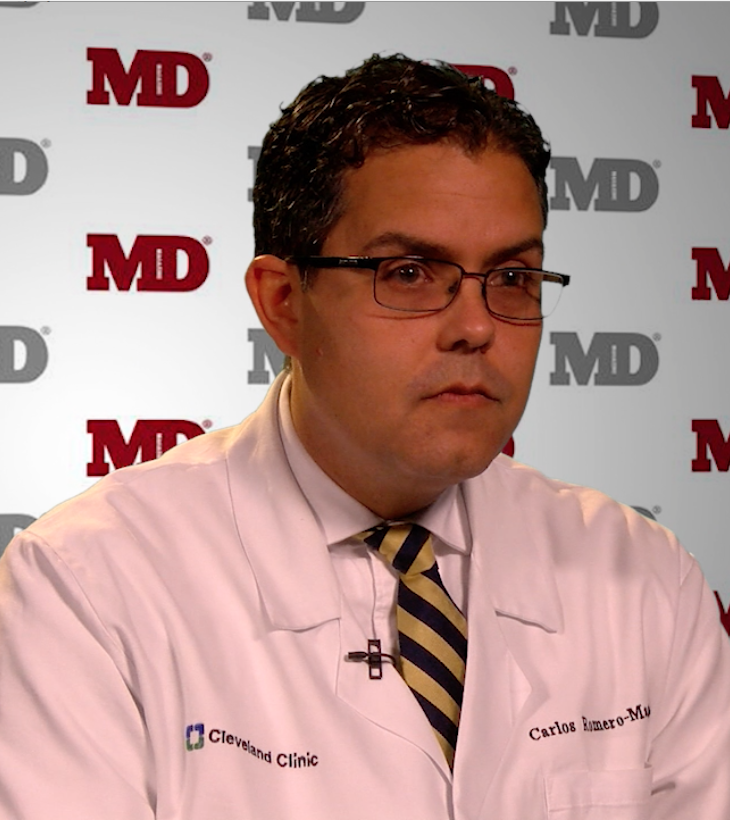Article
Carlos Romero-Marrero on Hepatitis B Cures, HCV Targeting, and the Opioid Epidemic
Author(s):
The Section Head of Hepatology at the Cleveland Clinic discusses current issues in treating hepatitis, and what's still to come in possibly eradicating the disease.
Carlos Romero-Marrero, MD, Section Head of Hepatology at the Cleveland Clinic, sat down with MD Magazine recently to discuss what he believes are some of the major issues in hepatitis B and C care now, how far treatment has come, and how much further it has to go in light of the opioid epidemic.

With hepatitis B, we’re very hopeful in the next 5 years they’re going to find the right agent to really achieve a cure. Presently, the status of the medications we have approved for hepatitis B are just suppressing the virus. There’s different mechanisms being explored to try to achieve a cure, and it’s kind of following the same rationale of combination agents. That’s what happened with hepatitis C — they were trying to attack the virus from different ends, from different mechanisms. We’re not there yet, but we’re certainly closer than we were a couple of years ago.
The hepatitis B treatment is essentially for a lifetime, so we have to make sure we’re getting the right agent that’s suppressing the virus, and has the safety profile for patients.
With regards to hepatitis C, there’s a lot of advances being made. We’ve come from 5 years ago in which we had medication with a lot of side effects, to having direct-acting antiviral agents in which we have medications that are very efficacious. In the medications that are approved, we have a 95 to 99% efficacy rate.
But also, these are safe medications, and are easy for the patient to use. There’s still challenges in terms of access to treatment. Certainly, there’s still challenges of making sure the patients are aware they have the infection. But where we are right now, we can treat safely most of the patients with hepatitis C.
Most recently, we have 2 agents that have been approved for patients who have not responded to the NS5-A inhibitors. These are new options that we have for patients that we rarely see not responding to those agents. We’re also making the treatments shorter, so we can treat patients of all genotypes without cirrhosis for 8 weeks, which is certainly going to help decrease the cost of these treatments.
What are the still-to-come advances to eradicate hepatitis C?
The (US Department of Health & Health Services) created the Viral Hepatitis Action Plan, supposed to last until 2020. I think that, knowing we have good treatment, there’s a lot we need to do in physician awareness — making sure we’re targeting the Baby Boomers, that we’re actually screening them. And also, that we’re screening the high risk populations: patients who have been incarcerated, patients who are injectable drug users, patients who have HIV, men who have sex with men. Those are populations that we need to be aware of and we need to screen.
It’s very unlikely that most of the patients out there know they have hepatitis C. Truly, maybe 40% of patients know they have hepatitis C, so we certainly need to improve in the screening. We also need to improve the access to treatment. As I mentioned before, we have good treatment, but we also have treatment that doesn’t have a lot of side effects. We’re hoping the providers that can treat hepatitis C actually increase this, just to make sure the patients that need it have access to treatment.
It’s interesting to say that we saw the hepatitis incidence was decreasing. We know from recent data from the Center for Disease Control (CDC) that the incidence of hepatitis C has actually tripled in the last 5 years, especially in the population between the age of 20 and 29. Even though we thought hepatitis C would not be a problem past the year 2020, certainly with the recent challenges of the opioid epidemic, this may be a problem we have to deal with a longer time than we thought.
What have been some of the Cleveland Clinic’s efforts to help ease the pain and issues surround the opioid epidemic?
We’re actually creating a hepatitis C curb path. There’s going to be a lot of proactiveness and prevention. When we talk about the opioid epidemic, we have to understand these are usually patients that are starting some kind of pain medicine for whatever reason, and they’ve created a dependency on their medications. They usually jump up to the intravenous drug use of this — heroin.
Certainly, there’s a lot we’re trying to do in that care path. Once we identify a patient, we offer them the necessary services of rehabilitation programs to try to break the cycle of the pain management or the opioid dependence.
Also, we’re trying to improve how we give access to the treatment. Once you are diagnosed with hepatitis C, what will be the easiest way of the patients to get access? We’re looking at different options in distance health, for patients who cannot come to Cleveland to get treatment — where we could do some virtual visits and with the guidance of some local providers, we can certainly facilitate the treatment. We’re also looking at, once we get a patient treated, how we’re going to follow up with those patients. I think the virtual visits will be very important in how the patients follow up with us.
Related Coverage
Liver Cancer Risks Not Affected by Hepatitis C Eliminating Therapy
Baby Boomers Increase HCV Screenings, Treatment When Alert Added to Health Records
FDA Committee to Review Safety of Hydrocodone, Codeine for Children





